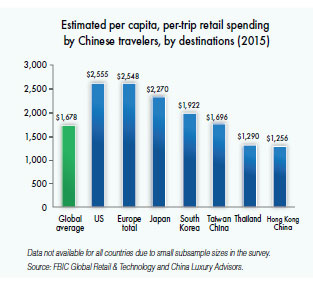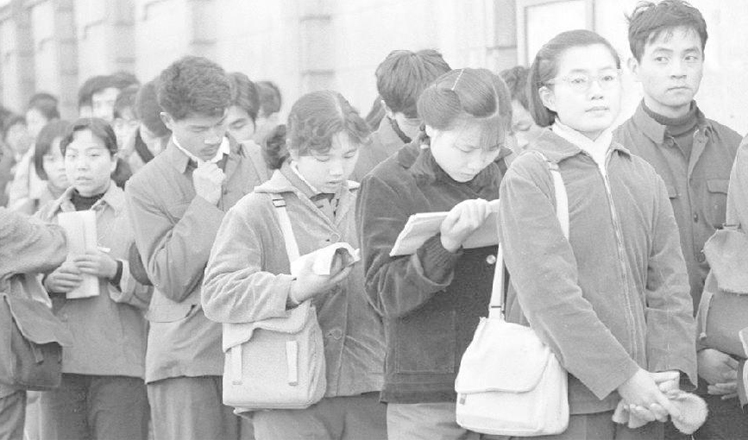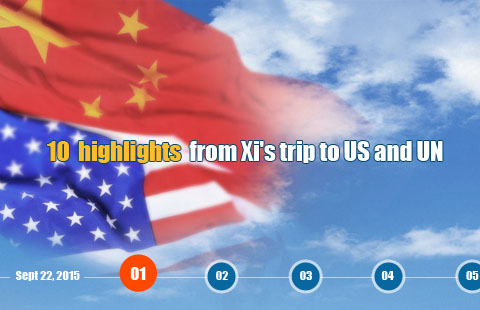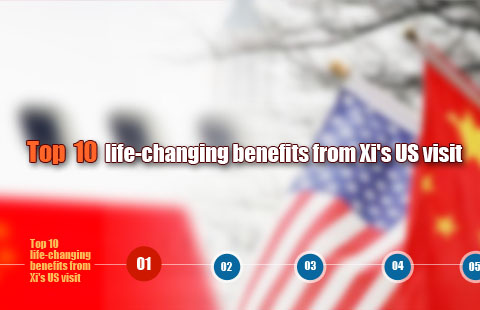Going the Highway 1 route
Updated: 2015-10-02 10:43
(China Daily USA)
|
|||||||||

The Internet is playing a revolutionary role in the tourism industry and is fundamental to the rise of independent travelers because it allows them to access information which only travel agencies used to have, Gu explained.
For example, rental car reservation platforms such as zuzuche.com and ctrip.com enable Chinese tourists to easily make reservations that fit their needs. Zuzuche.com, which has partnerships with Avis, Hertz and Enterprise, even provides free WiFi and Chinese GPS to its users traveling in the US.
For major US rental car companies, to capture the tremendous market potential with Chinese tourists they offer special rates to compete against traditional tour operators.
Traditional tour operators have felt the impact of the new visa policy, the growing car-rental business and the rise of FIT.
Amy Zhao, president of MGM Holiday, a Bay Area-based tour agency, said her company has experienced a decline in business compared with last year.
So many traditional tour operators are trying to tap into this growing FIT market by offering customized travel options, such as parachuting, hunting or road trips with recreational vehicles, she said.
"The FIT has become the fastest growing sector in the travel market," said Daniel Shen, a veteran tour operator and tourism strategy consultant in Los Angeles.
It is believed that FIT will eventually soar to 70 percent of the market, though package tours, as the core business of Chinese travel agencies, are expected to dominate for the next decade, said Shen, president of East West Marketing Corp and Lion Tours USA Inc.
Regional tourist boards and other public sectors responsible for tourism development also try to attract Chinese FIT travelers with themed travel and independent trips in contrast to the escorted shopping trips.
"Colorado, for instance, is not a traditional destination for Chinese tourists, but it is gaining attention for its natural scenery," said Shen, who represents 17 US states or cities, including Colorado, Texas, Georgia, Seattle and Chicago, to promote their tourism in China. A photography group from China had just wrapped up a tour in Colorado, he said.
"I believe the market promises a great potential, because huge differences exist between the Chinese and the US markets and differences mean business opportunities," Shen said.
"With middle-class incomes rising, millions of Chinese are poised to take their first overseas trips, joining group tours and visiting the world's biggest cities and most popular destinations," said Deborah Weinswig, author of Global Chinese Travelers: The Next Great Retail Market, a recently published report by Fung Business Intelligence Centre, a retail and technology think tank, and China Luxury Adviser.
"Meanwhile, the number of experienced overseas travelers will continue to increase as Chinese travelers take their second, third and fourth trips overseas," Weinswig added.
Last year, Chinese travelers made 114 million overseas trips, up 20 percent from a year earlier, and spent more than $140 billion on those trips, becoming the world's top spenders in international tourism, according to "Visit California".
In contrast, 234 million Chinese are predicted to travel globally by 2020, with their total overseas spending expected to reach $422 billion, according to the report.
Gearing up to tap the booming market of outbound Chinese travelers, the San Francisco-based home-sharing startup Airbnb partnered with investment firms Sequoia China and China Broadband Capital in August, which contributed to a $1.5 billion investment, to find a CEO for its China operations and widen its foothold in the country.
Airbnb said in a statement that the number of outbound Chinese travelers using its service grew 700 percent in the past year and that the two Chinese investment firms will help it customize technology for the Chinese market and establish a "localized presence" in the country.
The Chinese version of Airbnb's website is available and users are able to place orders in China through Chinese online payment platforms of Alipay or UnionPay.
Another growth point will be the LGBT (Lesbian Gay Bisexual Transgender) market, said Gu.
According to Hong Kong-based venture capital firm LGBT Capital, the annual purchasing power of China's 70 million-strong LGBT population amounts to $300 billion.
As their acceptance continues to rise in China, greater demand is expected for travel products specially tailored to this demographic, which is largely untapped yet, said Gu.
In June, Beverly Center, a shopping mall in Los Angeles, collaborated with Alibaba's subsidiary Taobao, and launched a campaign - My Rainbow Valentine - to host 10 Chinese LGBT couples, who traveled to Los Angeles to get married after winning an online contest hosted by Taobao.
"The new trends of Chinese tourism will drive significant numbers of repeat visitors and stimulate in-depth tours as well," Shen said. "The Chinese tourists will travel farther afield in the US."
Contact the writer at liazhu@chinadailyusa.com
- Russian warplanes hit IS targets in Syria
- Senior US envoy to visit Japan, S Korea, China
- Russia, US agree to cooperate in solving Syria crisis: Russian FM
- Iranian President calls Iran deal victory over war
- LatAm experts praise Xi on yuan, globalization
- Evidence found of summertime water flows on Mars: study

 Candlelight vigil for Oregon shooting victims
Candlelight vigil for Oregon shooting victims
 Chinese people's pursuits in different eras
Chinese people's pursuits in different eras
 Ten highlights from Xi's trip to US and UN
Ten highlights from Xi's trip to US and UN
 Top 10 life-changing benefits from Xi's US visit
Top 10 life-changing benefits from Xi's US visit-
 Highlights of President Xi's speeches at UN
Highlights of President Xi's speeches at UN -
 The president's historic journey to the west
The president's historic journey to the west -
 China's first lady visits Juilliard School
China's first lady visits Juilliard School 
 Across Canada
Across Canada
Most Viewed
Editor's Picks

|

|

|

|

|

|
Today's Top News
Huntsman says Sino-US relationship needs common goals
Xi pledges $2 billion to help developing countries
Young people from US look forward to Xi's state visit: Survey
US to accept more refugees than planned
Li calls on State-owned firms to tap more global markets
Apple's iOS App Store suffers first major attack
Japan enacts new security laws to overturn postwar pacifism
Court catalogs schools' violent crimes
US Weekly

|

|








